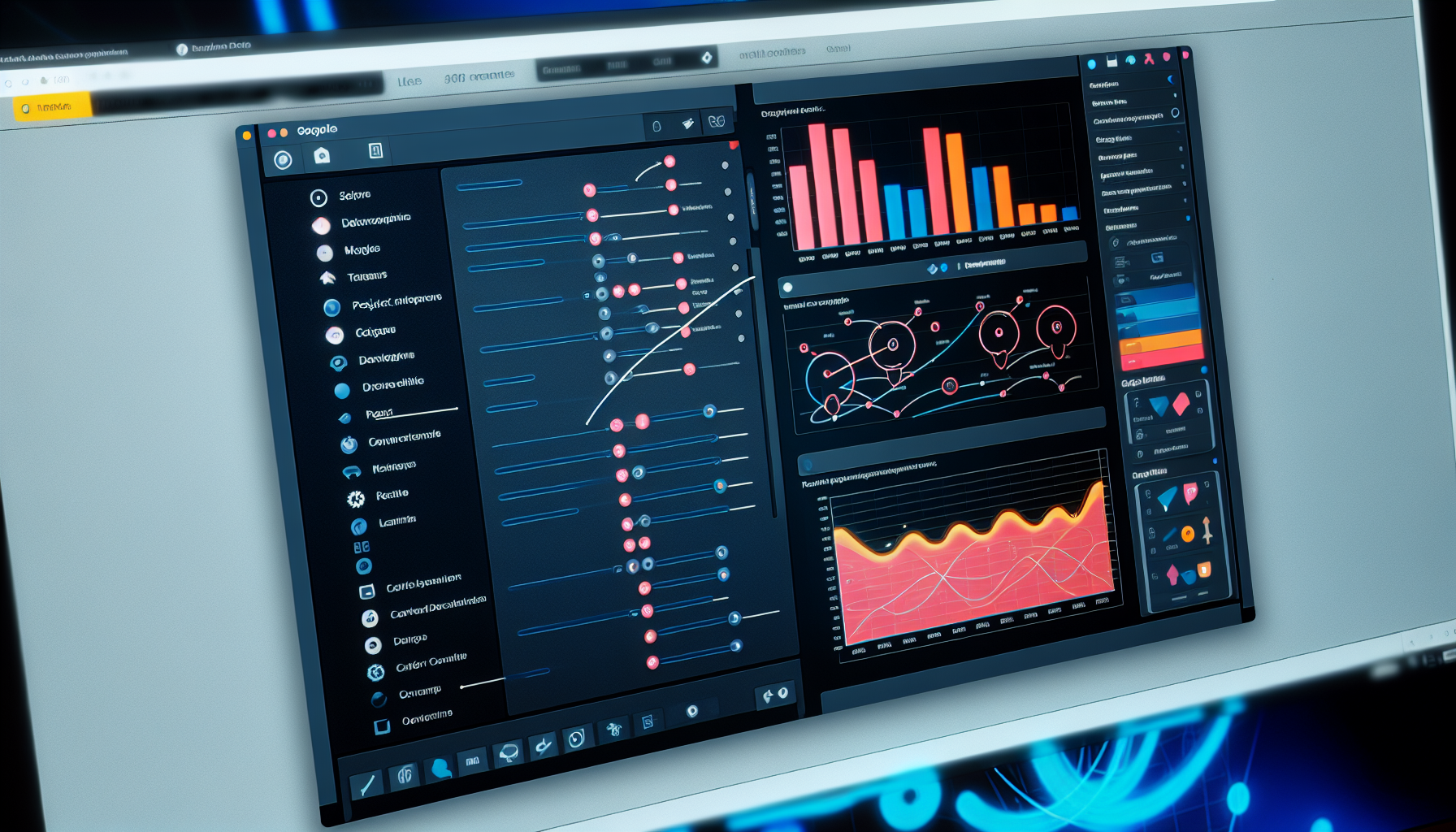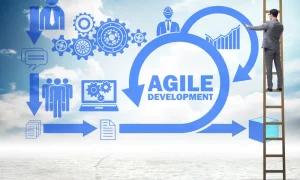The technical project portfolio manager is key in ensuring that technology initiatives align with and advance business strategies. In this article, we delve into their responsibilities, from strategizing alignment of multiple tech projects to analyzing their impact on organizational goals. Perfect for those considering the role or refining their management strategies, we explore the expertise required to succeed in the role of technical portfolio manager.
Key Takeaways
- A Technical Project Portfolio Manager orchestrates various projects strategically, ensuring alignment with long-term business goals, and requires strong analytical and leadership skills.
- Utilizing project portfolio management tools is essential in Project Portfolio Management (PPM) as they integrate technology to provide transparency, improve decision-making, and align IT projects with business strategy.
- These tools are pivotal for managing and prioritizing projects, offering features that serve portfolio managers in the analysis and optimization of costs, resources, and technologies for all projects within a portfolio, and the collection and analysis of data to ensure alignment with strategic planning and goals. Asana and MS Project are examples of such tools that are pertinent for managing and prioritizing projects.
- Continuous professional development, through certifications and skills enhancement, is crucial for career progression in technical project portfolio management, with the goal of evolving into senior management roles that influence broader strategy.
Understanding the Role of Technical Portfolio Manager
A Technical Project Portfolio Manager position includes strategic management of translating top level objectives to project execution. Contrary to project managers that concentrate on single projects, portfolio managers are responsible for numerous programs and activities with an orientation on long-term planning. They are responsible for mapping the links between several projects and ensuring compatibility with the company’s general direction.
Great analysis is necessary to ensure that technology-related project alignments are achieved with the outcomes that a portfolio manager wants of many projects in the organization. The partnership with Project Management Office (PMO) is essential for the strategic alignment of projects with the goals of the organization, benefiting from the expertise of PMO in project analysis, optimization, and governance.
Key Responsibilities
Among top duties of Technical Project Portfolio Manager is to develop and implement the functionality represented by phase-gate and prioritization, for instance. In addition, this position is concerned with a seamless working of portfolio management process as a whole, putting an emphasis to team members’ accountability for following the set procedures and change management.
This position requires effective documentation and knowledge transfer to continue set standards. An advocacy part is crucial there the Senior Leaders receive teaching on best practices of project portfolio management. Recommendations though can be issued to the governance overseers by the Portfolio Manager while having the power over the whole process.
The PMO Director and governance teams collaboration are critical in ensuring that the project portfolio processes are compliant, yet effective.
Skills and Expertise Required
It is important to note that the technical project portfolio managers should have a set of skills, including the knowledge of the project life cycles methodologies (Agile, Waterfall). They should also have a thorough knowledge of IT portfolio management methodologies such as PMI’s PfMP. They require a high analytical capacity to analyze the data of projects and portfolios.
Good communication is important for project portfolio managers because they need to communicate their analysis and recommendations to not only operational teams but also leadership teams. The requirements for this role include the leadership skills, which entail the ability to read market trends, forecast possible problems or opportunities, take ultimate decisions, and unite people in a common purpose.
Skills in using software such as MS Project and an understanding of computer information systems are mandatory qualifications for technical project portfolio managers. Furthermore, a four years degree (preferably graduate) in business administration or any other relevant field provides a perfect starting point. Gaining an understanding of various methods utilized by organizations in managing multiple projects under a single program is priceless experience obtained from portfolio management practices exposure.
The Intersection of Technology and Portfolio Management
Technology is a key player in starting and managing project portfolios primarily in project acquisition and project concept generation. With its assistance, portfolio management can enhance decision-making by providing information about the status of each individual project, resource performance evaluation, as well as an overview of the expected timelines.
Technology, in turn, supports all three key elements that make up a mature PPM approach – alignment with overall goals, flexibility throughout the implementation process, and value-driven choices. Using this tool, some tasks, including prioritizing projects by linking them to company objectives, efficiently allocating resources, and making well-informed decisions based on available data become achievable within a proper portfolio management system.
Integration of project portfolio management process with technology improves the ability of risk control, prognose of results and assurance that projects are in line with organization’s key business strategies and desired outcomes.
Aligning Tech Projects with Business Strategy
Project Portfolio Management (PPM) is a system of efficient project delivery that strives to achieve maximum business value. It is accomplished by at the strategic level aligning company objectives, choosing projects that support these goals and maintaining the portfolio of projects aligned with long-term business objectives. PPM focuses on projects that can help the organization achieve its goals and also allows for optimal resource management.
In PPM, senior leadership is involved in portfolio planning by trying to link the organization’s strategic plan with the right projects based on priorities and the current situation. However, technical project portfolio managers have the task of ensuring that IT-related initiatives are in line with the overall business objectives by using strategies that combine both PPM and ITSM approaches.
Managing Multiple Technology Projects Simultaneously
Portfolio management is one of the key IT departments, and portfolio managers have significant roles to play. These involve evaluating the business value and return on investment (ROI) of projects, prioritizing them according to the resources availability and strategic goals and also controlling their timing to avoid possible interruptions that may take place.
Proper prioritization is one of the key elements of effective project portfolio planning necessary for the successful implementation. To help with that, many use roadmap tools which give a visual representation of all projects aligned together in one timeline. Continuous monitoring enables adjustments to be made through data-driven insights hence, the portfolio remains aligned with its strategic goals. Examples of widely used roadmap tools include Asana, Twitter, Monday.com, Siri, and Microsoft Project.
Thus, modern organizations to manage their project portfolios efficiently and make informed decisions throughout the course use different effective project management software solutions, the mentioned ones included. They allow continuous monitoring of the developments associated with various projects, thus ensuring meaningful compliance with the strategic aims.
Tools of the Trade: Technical Project Portfolio Management Software
Project portfolio management is a more sophisticated approach where the tools help to organize, prioritize and assess the potential value of projects within a portfolio. These tools are paramount to portfolio managers by providing the analysis and optimization tool of a cost, resources, and technology of all projects within a portfolio.
They also participate in data collection and analysis to ensure that the data is consistent with strategic plans and goals. This gives an overall picture which assists in choosing the project and initiatives. The system could improve vital issues of the technical project management, as efficient processes, effective dashboards and road maps, portfolio optimization and finding complementary technologies..
Evaluating PPM Tools for Technical Projects
The scalability, integration capabilities and user-friendliness are some of the aspects to keep in mind as regards to PPM tools for technical projects. A decent PPM tool must have the ability to cater root for both waterfall and agile methodologies in order to effectively control project portfolios. It should also be able to comply with agile methods or adopt a hybrid style that satisfies changing project needs.
In features, certain critical features are much required to manage technical project easily with the PPM tools. The given include such activities as tasks creation and organization within a project portfolio and their proper allocation. Document management is another essential feature, whereas progress tracking guarantees that relevant files are quickly accessed and organized in relation to the projects managed through the tool.
Workflow automation helps in making processes more efficient whereas collaborative workflows are flexible thus enabling teams working on different components of a project portfolio to work closely together.
In general, for technical project management purposes some of the features that a PPM tool should have is that it should be able to facilitate functionality from task creation all the way to the final delivery and ensure all aspects of the process run smoothly by eliminating potential hurdles along each step in a time frame set at the start between stakeholder(s) & ultimately clients behind those endeavors.
Integration with Other Systems
A comprehensive combination of project portfolio management (PPM) supplements with IT Service Management (ITSM) or Enterprise Service Management (ESM) systems on a single platform allows consistent management of both service requests and projects. Integration of these critical functionalities, personalized dashboards are available for users in the unified ITSM and PPM platform, consolidating all relevant information for informed actions.
Successful adaptation into an organization’s ecosystem specifically requires the inclusion of functionalities in PPM tools that enable smooth integration with different ESM processes like HR service delivery. This facilitates coordination among various departments of a company to gain the best performance out of project portfolios.
Navigating Resource Management in Technical Projects
Resource management is one of the core areas of focus of Project Management Offices (PMOs) which work closely with team leads and managers in the efficient allocation and use of resources. In technical skill projects, resources management means the best strategies and schedules to use an organization’s resources efficiently.
They may be human competences, equipment, or technology in project management. PMOs, team leaders, and managers are crucial in this process, where they plan for future needs together and ensure that capacities are matched with the right expertise.
Balancing Workloads Across Tech Teams
Resource leveling is used to solve the problem where one resource works on several tasks simultaneously, ensuring a balanced workload across technology teams. Thus, mediums of frequent meetings are vital for evaluation of balance or imbalance between control and availability, where necessary adjustment in reallocation of resources is important.
Uneven work loads may require immediate action, such as rearranging tasks or changing project timelines. Using other resources such as freelancers can prevent any imbalances.
Allocating Technical Resources Wisely
Resource management software is critical to technical project portfolio managers for scheduling, utilization tracking and detailed resource allocation planning. To maximize effectiveness and prevent resource overuse, the target should be utilization of 90-95% with some margin for unforeseen activities.
Effective forecasting and planning of resources entail knowledge of the task dependencies that define the workflow within a project portfolio. It also encompasses controlling team allocations such that overcommitment is avoided. Depending on changing project scope or resource availability, redeployment of resources may be required.
Such activities are important for keeping a pace and reaching maximum productivity within a project portfolio. Higher professional and skilled individual can be very efficient through the use of specialized tools, they monitor resources through careful scheduling and tracking methods as such, technology-enabled management can provide maximum optimization in the outcomes of the project conducted by these skilled individuals.
Strategic Planning and Risk Mitigation in Tech Portfolios
The strategic aspect of the PPM in a technical project portfolio involves setting the strategic roadmap built on the organization’s mission and choosing the projects that will lead to strategy realization and ROI maximization.
A comprehensive approach is required in project portfolio risk management, which involves:
- Identifying risks
- Analyzing risks
- Monitoring risks
- Controlling risks
This approach is necessary to ensure readiness to balance risks with organizational capabilities.
Anticipating and Addressing Technical Risks
Creating a risk management plan for a project portfolio is very important since it outlines the process of identifying and assessing potential risks and opportunities.
Project portfolio management covers different processes among which regarding portfolios is one of them. This requires the protection of investments by constant measuring of risks and use of prescribed criteria to determine worth. It also includes the ability to see how business opportunities are part of the entire structure of risks in a project portfolio.
Ensuring Portfolio Value Through Strategic Alignment
Project portfolio management is a critical facilitator as it links the organization’s strategic objectives and the individual projects that are required to achieve these objectives. The primary objective is to make sure that every project in the portfolio is congruent with the corporate objectives. Through strategic synthesis methods, it identifies strategy gaps and leads timely commencement of relevant projects for long-term value.
The project portfolio selection and prioritization is based on factors including the viability, return on investment, and their strategic relevance toward long-term objectives. This selective nature ensures that each project eventually has a positive contribution to the realization of the organizational objectives.
Stakeholder buy-in too is critical to achieving synchronization between business strategies and long-term goals of which sustainable growth and profitability in organizations with well-implemented project portfolios.
Further Reading: Risk Management: Ultimate Guide to Navigating Uncertainties
Enhancing Communication within Technical Teams
Project portfolio managers also need great soft skills and executive presence to be able to communicate with the executive leadership and throughout the organization. When project managers changes into leaders of team, some social and communication capability becomes crucial as they needed to share resourcing across multiple projects.
Central communication platforms are important because they eliminate any barriers that may emerge by enabling smooth interactions between multiple projects in a project portfolio managed by these individuals.
Centralized Communication Platforms
Centralized platforms offer several benefits for teams, including:
- Streamlining decision-making across teams
- Facilitating idea sharing and feedback
- Turning discussions into actions
- Breaking down silos and eliminating communication barriers
By utilizing centralized communication, project teams can increase their chances of success.
Centralized communication systems foster openness, which enables team members to get the required resources and information in order to perform well. Centralized communication system is about having one truth towards a project, making different communication streams to be consolidated and then diminishing the risk of project failure or missed deadlines.
Overcoming Remote Work Challenges
The remote technical teams usually suffer from the effective communication, especially due to the written communication means that provide no non-verbal clues. This can lead to misunderstandings. In addition, it is useful for remote teams to communicate with each other through voice when they encounter complex matters and to use diverse channels like video calls, voice calls, emails, and chats.
Through well-thought guidelines for communication, remote teams enhance collaboration by defining response time expectations, prescribing preferred communication channels, and dictating acceptable forms of interaction. These actions aid in fostering clarity in team members when working remotely.
Career Path and Progression for Technical Project Portfolio Managers
Evolving into higher levels of technical project management begins with lower level positions like project coordinator or assistant project manager. With experience, technical project managers should target senior level roles where they will be tasked to manage bigger and more complex projects with longer duration.
With the ongoing development, senior project managers may be promoted to directors of the whole department. This position is oriented toward strategic management and the accomplishing of all ongoing projects that are a part of the organization’s portfolio.
Building Experience in Technical Domains
The common route to a technical project manager post usually commences with entry-level jobs or jobs in several industries. Practical skill in the specialized areas like software development in the case of the construction industry and civil engineering will play a key role in project management of the projects, which have technical characteristics.
Consulting work can also be helpful for those who wish to become technical project managers, as it provides them with the opportunity to work on different projects and learn about various business practices that are necessary skills for such a position.
Continuous Learning and Certification
To move forward with your career in the field of technical project manager, the following steps can be taken. Firstly, one should consider the acquisition of certifications such as PMP or those that are primarily focused on agile methodologies since they show your expertise to future employers. Secondly, participating in educational programs such as Google’s Project Management: Professional Certificate can be used for the development and maintaining of the relevant skills to be successful in this area.
You through the activities of attending seminars, workshops will also make your growth. Developing key competencies like strategic thinking and effective communication through repeated practice is critical in considering advancement opportunities. Therefore, it is crucial to know all current portfolio management techniques in order to be competitive in this sector.
Practicing these steps consistently towards becoming better professionally will help you in a big way, to succeed especially in undertaking technical project management roles working with other professionals who are totally dedicated to staying updated about latest developments in portfolio management techniques.
This constant endeavor would place your career advancements in a unique continuous line perfecting some important other skills as equally valuable and making a substantial contribution to the client’s projects by ensuring a consistent economical money management of their portfolios.
Further, this approach may perhaps be invaluable in the long-run for clients need reliable support when assigning their projects that involve qualified respondents to be able to obtain results, to be able to complete smoothly, and to deliver the projects in time.
Summary
In summary, the role of the Technical Project Portfolio Manager is very vital in the technology industry. They are very important in the translation of high-level objectives into project execution and are the ones, who develop portfolio management framework process, ensuring in compliance with governance standards. Using such tools as project portfolio management software, they manage technical projects quite well.
Resource management is critical for the correct balance of workloads and resources allocation. Strategic planning and risk controls also play an important role in the maintenance of value of linked business strategies portfolios. The effective communication within the technical teams is paramount for the benefits of the remote work challenge that requires an attentive execution.
The experience growth in the technical areas coupled with lifelong learning through these opportunities paves the way to become successful Technical Project Portfolio Managers who manage complex projects effectively under pressure through various techniques that relate to project portfolio management practices that include task management by stakeholders, timely communication among all team members among others, sustaining value such as realizing company strategic goals.
Frequently Asked Questions
What does a technical Portfolio Manager do?
The part of a technical portfolio manager includes the management of the whole life cycle of a large portfolio, project-level evaluations, process and procedures reform, opportunities for improvements identification, detailed reports of analysis, and training of team members. They may be in charge of introducing methodologies such as Agile or Scrum for the enhancement of management in IT portfolios.
What does a project portfolio manager do?
The purpose of the project portfolio manager is to ensure that all projects within the portfolio adhere to organization’s overall strategic goals and business objectives. This includes deploying several approaches like thorough business analysis, budget review, future outcomes forecasting, risk management and ensuring effective stakeholder engagement through the entire process. The attention is given to the alignment of projects with organizational approaches for effective projects management.
What is the difference between PMO and PPM?
The difference between a PMO and PPM is that a project portfolio is the set of projects being undertaken by an entity, while Project Portfolio Management (PPM) is an organized approach to evaluating and prioritizing potential benefits of several projects. This strategy focuses on controlling different initiatives in the organization’s project portfolio.
What tools do Technical Project Portfolio Managers use?
Specialized software for project portfolio management is used by Project Portfolio Managers to organize, prioritize, and evaluate the expected value of the projects within a given portfolio. It helps to ensure that the management of such portfolio-based projects is handled by experts who have been trained to handle portfolios of various projects using this particular type of software and hence making it very easy to handle and make decisions.
What is the career path for a Technical Project Portfolio Manager?
To be successful in a career as a Technical Project Portfolio Manager, people usually start in junior roles in project management, move on to senior roles and eventually transition into directorial roles. This track is centered on life-long study and certification for career development while managing a number of projects within a portfolio.









